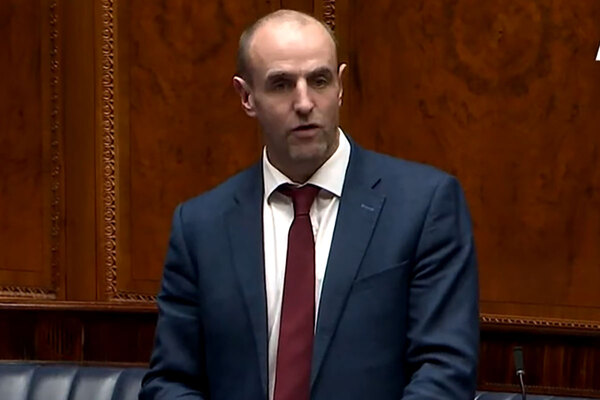You are viewing 1 of your 1 free articles
Building communities helps combat loneliness
As a new survey shows two-thirds of people in Northern Ireland are lonely, Nicola McCrudden explains what social housing providers are doing to help.
Nearly two-thirds (63%) of people in Northern Ireland are lonely – according to a recent survey.
The Rotary Club’s State of the Nation survey questioned people aged 16 to 59 on social and community issues.
It found that the highest percentage of people feeling isolated were in the 16 to 29 age group (71.5%), followed by 62.7% of those aged 30 to 44 – so loneliness doesn’t only affect older people.
What surprised me most is that 25% of those surveyed don’t know the names of their neighbours.
“The Troubles caused huge dislocation of families”
Decline in community spirit apparently is to blame. Perhaps previous generations put a greater value on neighbourliness.
Many of us remember, or were told about, the good old days when front doors were open and neighbours dropped in to borrow a cup of sugar.
So what has changed since those days? Well slum clearance and civil unrest had a profound affect in Northern Ireland, particularly in urban areas.
The Troubles caused huge dislocation of families. Between 1969 and 1973 some 60,000 people – 12% of Belfast’s population were forced to leave their homes. It was described by historians as Europe’s largest movement of population since the end of World War II.
At that time Northern Ireland had the worst housing conditions in the UK – among the worst in Europe. Shortly after the Housing Executive was established a house building programme of unsurpassed scale began and by 1996 it had built more than 80,000 homes.
Gone are the days of new build, large scale, social housing developments. Housing Executive estates are mixed in terms of tenure and we are seeing increasingly more private tenants living in estates – that brings with it more transience.
So how do we rebuild a community? Well social housing providers are doing exactly that – they build communities as well as homes.
“We are seeing increasingly more private tenants living in estates – that brings with it more transience.”
A good example of this is the Housing Executive’s community cohesion work. It aims to create more stable, safer communities and involves developing strong, positive relationships between people from different backgrounds in the workplace, in schools and within neighbourhoods.
Other excellent examples are all finalists at our recent Chartered Institute of Housing Northern Ireland Housing Awards. Connswater Homes is partnering with Groundwork NI to deliver the ‘Mersey Street, Mind, Body and Soil Project’ operating in east Belfast. The project has transformed unused land into a hub of community activity through the creation of a community garden that benefits tenants and the wider community.
Radius Housing’s Greyabbey Community Hub is a brand new community space serving 362 homes in the area, where a range of providers across the city offer community empowerment activities focused on inclusion, education, health and well-being.
Choice Housing is partnering with the ‘Live Here Love Here’ small grants scheme to support neighbourhoods to come together to transform their local areas while learning new skills and building relationships.
The Housing Executive is funding and supporting residents of Edgarstown in Portadown to create a platform to engage and participate with their local community, which is a community-led response to prevent and address anti-social behaviour issues.
“In the age of digitisation, when we should be more connected, people are feeling more isolated than ever.”
I could go on, as there are so many great examples of partnership working in Northern Ireland involving housing providers that go beyond bricks and mortar.
This work is very rewarding but challenging.
In the age of digitisation when we should be more connected people are feeling more isolated than ever.
Busier lives and people living further away from families can explain some of this. The survey backs this up with more than 92% of people said they felt bogged down by the stresses and strains of modern life.
Housing is a people business. We’re about creating great neighbourhoods – not only does it make makes good business sense, but it is the right thing to do from a social perspective. It is the social in housing.
Personally – even though you’ll find me glued to my phone tweeting out most days of the week – you can’t beat talking to people face to face, give me that any day.
Nicola McCrudden, director, CIH Northern Ireland
More episodes of The Housing Podcast
Review of the year 2019
As the year draws to an end, The Housing Podcast team wraps up the last 12 months, battles it out in a housing quiz, and looks ahead to 2020.
What did the Grenfell Inquiry phase one report say?
This week, Sir Martin Moore-Bick published his Phase One report from the public inquiry into the Grenfell Tower fire in June 2017. The 838-page report focuses on the events of that dreadful night: how the blaze started, how it spread so ferociously through the building, and how organisations including the emergency services responded.
Sir Martin has also produced recommendations aimed at preventing similar disasters from happening again. Our team has spent the last few days picking through the report, and in this episode of The Housing Podcast, we discuss the key points.
As Boris Johnson takes over at Number 10 Downing Street and appoints his new cabinet, the Housing Podcast team present their first ever 'emergency' episode, looking at whether he is set to shift the housing policy dial back towards home ownership.
The Homes Fit for Human Habitation Act is on the statute book. But what is it for? What does it do? And will it work?
Karen Buck MP, who guided the bill through parliament, along with housing lawyers Giles Peaker and Justin Bates – who wrote it – sit down with The Housing Podcast to answer all this and more.
Theresa May scraps the cap: what does it mean?
To the delight of councils across the country, Theresa May announced this week that she will scrap the Housing Revenue Account borrowing cap.
With the help of Eamon McGoldrick of the National Federation of ALMOs, in this week’s episode of The Housing Podcast we discuss the history of this contentious area of housing policy and look at what happens now.
The true cost of homelessness
Inside Housing has conducted in-depth research into the amount councils are spending on temporary accommodation for homeless people, with shocking results.
In this episode of The Housing Podcast, we take a look at the financial aspect of homelessness and discuss the figures with Matt Downie, director of policy and external affairs at Crisis.
Rating the Social Housing Green Paper
The Housing Podcast team is joined by David Pipe from the Chartered Institute of Housing and housing columnist Jules Birch to rank the proposals in the Social Housing Green Paper out of 10. Edited by Luke Barratt.
Listen or download here:
The supported housing saga
The government’s announcement this week that it will drop plans to change the way supported housing is funded brings to a close a nearly three-year cycle of lobbying against these proposals.
This week, The Housing Podcast looks back at this story, which began with a throwaway line in George Osborne’s Autumn Statement in 2015.
A brief history of council housing
In this week’s episode of The Housing Podcast we speak to John Boughton, social historian and author of Municipal Dreams: The Rise and Fall of Council Housing, about the five phases of local authority housing – starting in the East End of London in 1900.
Who has been the best housing minister since 2010?
The Housing Podcast team gets together to rank all the housing ministers of the modern Tory era, from Grant Shapps to Dominic Raab. There are a lot of them. Edited by Luke Barratt.
Listen or download here:
The Hackitt Review
This week, Dame Judith Hackitt released the findings of her building regulations review, commissioned by the government in the wake of the Grenfell Tower fire last June.
Featuring an interview with Dame Judith, the team takes a look at what was in the report – and why some people were less than impressed.











